
PSYCHOPHARMACOLOGY
Scope & Guideline
Exploring the Nexus of Drugs and Behavior
Introduction
Aims and Scopes
- Behavioral Pharmacology:
Research examining how drugs affect behavior in both human and animal models, including studies on addiction, anxiety, depression, and cognitive functions. - Neuropharmacology:
Investigations into the mechanisms of drug action at the molecular and cellular levels, including receptor interactions, neurotransmitter systems, and neurobiological pathways. - Clinical Psychopharmacology:
Studies focusing on the efficacy and safety of pharmacological treatments for mental health disorders, including clinical trials and meta-analyses. - Psychedelic Research:
Exploration of the therapeutic potential of psychedelics for various psychiatric conditions, including depression, anxiety, and substance use disorders. - Sex Differences in Drug Response:
Research examining how biological sex influences drug effects, addiction vulnerability, and treatment outcomes in both preclinical and clinical settings. - Translational Research:
Studies that bridge preclinical findings with clinical applications, promoting the translation of basic science discoveries into therapeutic interventions.
Trending and Emerging
- Psychedelics and Mental Health:
There is a growing trend in exploring the therapeutic applications of psychedelics, such as psilocybin and ayahuasca, for treating various psychiatric disorders, indicating a resurgence of interest in these compounds. - Cannabis Research:
Research on cannabis and its components, particularly CBD and THC, is rapidly increasing, focusing on their therapeutic effects, mechanisms of action, and implications for mental health. - Neuroinflammation and Mental Health:
Investigations into the role of neuroinflammation in psychiatric disorders are gaining traction, emphasizing the need to understand how inflammatory processes contribute to conditions such as depression and anxiety. - Precision Medicine in Psychopharmacology:
There is an emerging emphasis on personalized approaches to treatment, considering genetic, epigenetic, and individual differences in response to psychotropic medications. - Behavioral Economics in Substance Use:
A growing body of research is examining the economic principles underlying substance use behaviors, helping to understand decision-making processes related to addiction. - Social and Environmental Influences on Drug Use:
Research is increasingly focusing on the impact of social dynamics and environmental factors on drug use and treatment outcomes, reflecting a holistic view of addiction.
Declining or Waning
- Traditional Antidepressants:
Research on older classes of antidepressants appears to be waning, as newer treatments, including psychedelics and novel pharmacological approaches, gain attention. - Animal Models of Simple Behaviors:
Studies focusing solely on basic behavioral responses in animal models (e.g., simple reflexes) are becoming less common, with a shift towards more complex models that incorporate social and cognitive factors. - Opioid Pharmacology without Contextual Factors:
Research that examines opioid effects in isolation, without considering social, environmental, and psychological contexts, is less frequently published, reflecting a broader understanding of addiction. - Standardized Drug Administration Protocols:
Research using highly standardized drug administration methods is declining in favor of more ecologically valid approaches that consider individual differences and real-world scenarios.
Similar Journals
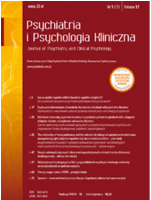
Psychiatria i Psychologia Kliniczna-JOURNAL OF PSYCHIATRY AND CLINICAL PSYCHOLOGY
Unlocking new perspectives in clinical psychology and psychiatric care.Psychiatria i Psychologia Kliniczna - Journal of Psychiatry and Clinical Psychology is a vital platform for advancing the fields of psychiatry and clinical psychology, published by Medical Communications in Poland. With its ISSN 1644-6313, this Open Access journal has been providing unrestricted access to impactful research since 2005, ensuring that findings in mental health are both accessible and disseminated widely. Although currently ranked in the Q4 quartile across Clinical Psychology and Psychiatry and Mental Health categories, and with the Scopus ranks placing it at 262/311 in Clinical Psychology and 493/567 in Psychiatry, the journal serves as a crucial resource for researchers seeking to explore innovative methodologies and therapeutic interventions. The journal's aim is to enhance understanding and treatment of psychiatric disorders by facilitating the exchange of knowledge between academia and clinical practice. As it converges from 2006 to 2024, Psychiatria i Psychologia Kliniczna remains committed to publishing high-quality articles that contribute toward the evolving landscape of mental health research.

ADDICTION BIOLOGY
Pioneering Research in Addiction BiologyADDICTION BIOLOGY, published by Wiley, is a leading peer-reviewed journal dedicated to advancing the understanding of addiction science. With an impressive impact factor and recognized as a Q1 journal in Medicine, Pharmacology, and Psychiatry and Mental Health, ADDICTION BIOLOGY occupies a crucial position in the scientific discourse surrounding the biological and neurochemical underpinnings of addictive behaviors. Since its inception in 1996, the journal has been at the forefront of research, fostering interdisciplinary collaborations and promoting innovative studies that explore the complexities of addiction. Researchers and professionals benefit from the journal's commitment to high-quality manuscripts, offering essential insights into prevention, treatment, and rehabilitation strategies for substance use disorders. Although it does not offer open access, ADDICTION BIOLOGY remains accessible through various academic libraries, ensuring that groundbreaking studies reach a global audience. This journal is indispensable for anyone seeking to deepen their knowledge in the rapidly evolving field of addiction research.
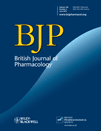
BRITISH JOURNAL OF PHARMACOLOGY
Pioneering insights into drug mechanisms and therapeutic innovations.British Journal of Pharmacology is a premier, peer-reviewed journal published by Wiley, specializing in the dynamic field of pharmacology. With a robust impact factor, this journal ranks in the top quartile (Q1) for pharmacology according to the 2023 category rankings, emphasizing its significance and reputation among the global scientific community. As an essential resource for researchers, professionals, and students alike, the journal provides a platform for innovative research spanning foundational studies to clinical applications in pharmacology, toxicology, and pharmaceutics. Since its inception in 1966, the journal has consistently contributed to the advancement of pharmacological science, fostering a deeper understanding of drug action mechanisms and therapeutic advancements. Although primarily subscription-based, the British Journal of Pharmacology is committed to disseminating high-quality research that shapes the future of the field.

Current Neuropharmacology
Unraveling the complexities of neuropharmacology.Current Neuropharmacology is a premier journal dedicated to advancing the field of neuropharmacology, published by Bentham Science Publishers Ltd in the United Arab Emirates. As a leader in its domain, this journal has achieved a remarkable position in 2023, with Q1 rankings across several categories including Medicine (miscellaneous), Neurology, and Pharmacology. With a robust focus on the latest research related to pharmacological treatments and their neurological implications, Current Neuropharmacology features cutting-edge studies that inform clinical practices and psychiatric care. Although not open access, the journal offers both print and electronic formats to cater to a diverse audience of researchers, healthcare professionals, and students keen on accessing vital information in neuropharmacology. Its high impact within the academia is underscored by impressive Scopus rankings, confirming its importance as a vital resource for the ongoing exploration of mental health and neurotherapeutic innovations. With an engaging scope that encompasses emerging discoveries and clinical advancements, Current Neuropharmacology continues to be an essential platform for scholarly communication in the evolving landscape of neuroscience and pharmacology.

Current Behavioral Neuroscience Reports
Unveiling Insights at the Intersection of Mind and EnvironmentCurrent Behavioral Neuroscience Reports, published by SPRINGERNATURE, stands at the forefront of advancements in the intricate field of behavioral neuroscience. Since its inception in 2014, this journal has steadily garnered attention within academic circles, boasting a commendable ranking among its peers, including a Q3 classification in Behavioral Neuroscience and a Q2 classification in Public Health, Environmental and Occupational Health as of 2023. Although it operates under traditional access models, the journal is committed to disseminating high-quality research that bridges the gap between neuroscience and behavioral studies, appealing to researchers, professionals, and students alike. With a notable E-ISSN of 2196-2979, Current Behavioral Neuroscience Reports facilitates valuable insights that are critical for understanding the underlying mechanisms of behavior and their implications for public health and environmental factors. This journal is essential for those seeking to contribute to a multidisciplinary dialogue that enhances our comprehension of behavioral neuroscience.
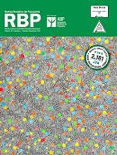
Brazilian Journal of Psychiatry
Empowering professionals with vital insights in psychiatry.The Brazilian Journal of Psychiatry is a prominent peer-reviewed journal dedicated to advancing the field of psychiatry and mental health, published by the Associação Brasileira de Psiquiatria. With an impressive Q2 ranking in the Psychiatry and Mental Health category for 2023 and a Scopus rank of #130 out of 567, this journal serves as a vital resource for researchers, clinicians, and students alike. Since its transition to Open Access in 1999, it has aimed to disseminate high-quality research, innovative practices, and critical insights relevant to mental health in Brazil and beyond. The journal's focus spans various topics in psychiatry, aiming to bridge the gap between research and clinical application, making it essential reading for professionals and academicians committed to improving mental health outcomes. With a commitment to fostering scholarly discourse, the Brazilian Journal of Psychiatry not only enriches the academic landscape but also enhances the practice of psychiatry through its widespread accessibility and dedication to excellence in research.

GENES BRAIN AND BEHAVIOR
Exploring the Nexus of Genes, Brain, and BehaviorGENES BRAIN AND BEHAVIOR is a leading journal published by Wiley that focuses on the intricate interplay between genetic factors and behavioral neuroscience. With a robust ISSN of 1601-1848 and an E-ISSN of 1601-183X, this journal serves as a premier platform for innovative research that spans across multiple fields including genetics, neurology, and behavioral neuroscience. Recognized for its significant impact with a 2023 categorization of Q1 in Behavioral Neuroscience and Q2 in both Genetics and Neurology, GENES BRAIN AND BEHAVIOR asserts itself as an influential resource for scholars, practitioners, and students alike, facilitating the advancement of knowledge in these dynamic areas. Its Scopus rankings underscore its prominence—ranking #18 in Behavioral Neuroscience and #45 in Neurology, placing it in the top percentiles among its peers. Although not an open-access journal, the rigorous peer-review process ensures high-quality publications, pivotal for those pursuing cutting-edge research and applications. With a history of convergence from 2002 to 2024, this journal continues to foster academic dialogue and discovery in the ever-evolving landscape of brain and behavioral studies.

NAUNYN-SCHMIEDEBERGS ARCHIVES OF PHARMACOLOGY
Illuminating the Complexities of Drug MechanismsNAUNYN-SCHMIEDEBERGS ARCHIVES OF PHARMACOLOGY is a prestigious journal published by SPRINGER, focusing on the dynamic fields of pharmacology and toxicology. With an ISSN of 0028-1298 and an E-ISSN of 1432-1912, this esteemed publication has been a staple in the scientific community since its inception in 1969, continuing to wield influence with a convergence of research that reaches through 2024. Ranked in the Q2 category for both medicine and pharmacology, it stands at an impressive 111th out of 313 in the Scopus rankings for pharmacology, reflecting its significant impact in the field. Though not offering open access, the journal remains a vital resource for researchers, professionals, and students seeking to explore groundbreaking studies and advancements in pharmacological science. With its high standards and comprehensive coverage, NAUNYN-SCHMIEDEBERGS ARCHIVES OF PHARMACOLOGY is essential reading for those dedicated to understanding the mechanisms of drug action and the complexities of therapeutic interventions.
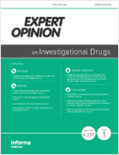
EXPERT OPINION ON INVESTIGATIONAL DRUGS
Shaping the Future of PharmacologyExpert Opinion on Investigational Drugs, published by Taylor & Francis Ltd, is a premier journal dedicated to the dissemination of high-quality, peer-reviewed research in the fields of pharmacology and medicine. As an integral part of the scientific community since its inception in 1994, this journal has established itself as a leading source of insightful analysis and expert commentary on emerging drug therapies, providing invaluable resources for researchers, clinicians, and healthcare professionals. With an impressive impact factor and ranking in the top quartile across multiple pharmacological categories, it remains a vital platform for discussing innovative drug developments and their clinical applications. Though it operates on a subscription basis, Expert Opinion on Investigational Drugs is crucial for anyone involved in pharmacological research and the drug development process, positioning itself at the forefront of medical advancements and offering critical insights into the rapid evolution of investigational therapies.
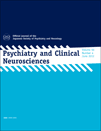
PSYCHIATRY AND CLINICAL NEUROSCIENCES
Transforming Psychiatric and Neurological Knowledge into ActionPSYCHIATRY AND CLINICAL NEUROSCIENCES is a leading journal in the fields of psychiatry and clinical neurology, published by Wiley. With a commendable impact factor and a position within the prestigious Q1 quartile across multiple relevant categories—including Medicine (Miscellaneous), Neurology, and Psychiatry and Mental Health—this journal stands out for its rigorous peer-reviewed content that addresses critical issues in mental health and neurological disorders. Established in 1933, the journal has a rich history of contributing impactful research that guides both clinical practice and academic inquiry. Although it is not an open-access journal, its high relevance is underscored by its Scopus rankings, with notable percentiles in Psychiatry and Neurology, making it a vital resource for researchers, clinicians, and students looking to stay abreast of the latest advancements. Located in the United Kingdom, PSYCHIATRY AND CLINICAL NEUROSCIENCES aims to bridge the gap between theory and practical application, fostering a comprehensive understanding of the complex interplay between mental health and neurological conditions.